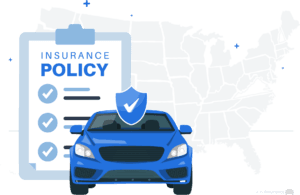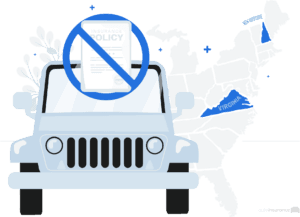
Where Is Car Insurance Mandatory?
Unless you live in Virginia or New Hampshire, car insurance is mandated by law.
Get quotes from providers in your area

Drivers in 48 out of the 50 states in the U.S. are legally required to have car insurance. This makes car insurance different from other types of insurance, including health and life insurance, which are not legally required. However, the exact requirements on coverages you need and the minimum limits vary by state. Read on to find out about the minimum mandatory coverage in your state.
Where Is Car Insurance Mandatory?

Every state but Virginia and New Hampshire requires drivers to have auto insurance for any owned or leased vehicles. So if you want to drive, you’ll need to purchase car insurance that meets each state’s insurance laws.
FYI
In every state except New Mexico, you’ll be able to show your proof of financial responsibility on your phone through a digital card.1
Why Is Car Insurance Mandatory?
One of the most frequently asked car insurance questions we get is “Why is car insurance mandatory?” If you didn’t have car insurance and you got into an at-fault accident, you’d be financially responsible for:
- Bodily injuries
Property damage
Lost wages
Medical payments
Since repair and healthcare costs are expensive and can be up to tens of thousands of dollars, the average person doesn’t have this money to pay these costs out of pocket. That’s where car insurance comes in. By paying regular premiums and your deductible, your insurance policy will cover you up to the limits you’ve selected. Car insurance protects everyone, both the driver and the other people involved in the accident, to “become whole” again, and pay minimal money out of pocket in at-fault accidents.
TIP
Instead of the minimum amount of coverage, we recommend getting full coverage, which includes bodily injury liability, property damage liability, collision and comprehensive coverage, uninsured motorist coverage, and medical payments coverage.
Minimum Requirements by State
Here are the exact minimum liability requirements by state:
| State | Minimum per person limit, bodily injury liability coverage | Minimum per accident limit, bodily injury liability coverage | Minimum per accident limit, property damage liability coverage | Minimum per person, medical payments or personal injury protection (PIP) coverage | Minimum per accident, medical payments or personal injury protection (PIP) coverage | Minimum per person, uninsured/underinsured motorist coverage | Minimum per accident, uninsured/underinsured motorist coverage | More required coverages |
|---|---|---|---|---|---|---|---|---|
| Alabama | $25,000 | $50,000 | $25,000 | Not required | Not required | Not required | Not required | Not required |
| Alaska | $50,000 | $100,000 | $25,000 | Not required | Not required | Not required | Not required | Not required |
| Arizona | $25,000 | $50,000 | $15,000 | Not required | Not required | Not required | Not required | Not required |
| Arkansas | $25,000 | $50,000 | $25,000 | Not required | Not required | Not required | Not required | Not required |
| California | $15,000 | $30,000 | $5,000 | Not required | Not required | Not required | Not required | Not required |
| Colorado | $25,000 | $50,000 | $15,000 | Not required | Not required | Not required | Not required | Not required |
| Connecticut | $25,000 | $50,000 | $25,000 | Not required | Not required | $25,000 | $50,000 | Not required |
| Delaware | $25,000 | $50,000 | $10,000 | $15,000 | $30,000 | Not required | Not required | Not required |
| District of Columbia | $25,000 | $50,000 | $10,000 | Not required | Not required | $25,000 | $50,000 | Not required |
| Florida | Not required | Not required | $10,000 | $10,000 | $10,000 | Not required | Not required | Not required |
| Georgia | $25,000 | $50,000 | $25,000 | Not required | Not required | Not required | Not required | Not required |
| Hawaii | $20,000 | $40,000 | $10,000 | $10,000 | $10,000 | Not required | Not required | Not required |
| Idaho | $25,000 | $50,000 | $15,000 | Not required | Not required | $25,000 | $50,000 | Not required |
| Illinois | $25,000 | $50,000 | $20,000 | Not required | Not required | $25,000 | $50,000 | Not required |
| Indiana | $25,000 | $50,000 | $25,000 | Not required | Not required | Not required | Not required | Not required |
| Iowa | $20,000 | $40,000 | $15,000 | Not required | Not required | Not required | Not required | Not required |
| Kansas | $25,000 | $50,000 | $25,000 |
| Not required | $25,000 | $50,000 | Survivors benefits, including up to $900 per month for a year for disability or loss of income and $25 per day for in-home services |
| Kentucky | $25,000 | $50,000 | $25,000 | Not required | Not required | Not required | Not required | Not required |
| Louisiana | $15,000 | $30,000 | $25,000 | Not required | Not required | Not required | Not required | Not required |
| Maine | $50,000 | $100,000 | $25,000 | $2,000 | Not required | $50,000 | $100,000 | Not required |
| Maryland | $30,000 | $60,000 | $15,000 | Not required | Not required | $30,000 | $60,000 | $15,000 uninsured/underinsured property damage coverage per accident |
| Massachusetts | $20,000 | $40,000 | $5,000 | $8,000 | $8,000 | $20,000 | $40,000 | Not required |
| Michigan | $50,000 | $100,000 | $1 million within MI;$10,000 outside MI |
| Not required | Not required | Not required | Not required |
| Minnesota | $30,000 | $60,000 | $10,000 | $40,000 | Not required | $25,000 | $50,000 | Not required |
| Mississippi | $25,000 | $50,000 | $25,000 | Not required | Not required | Not required | Not required | Not required |
| Missouri | $25,000 | $50,000 | $25,000 | Not required | Not required | $25,000 | $50,000 | Not required |
| Montana | $25,000 | $50,000 | $20,000 | Not required | Not required | Not required | Not required | Not required |
| Nebraska | $25,000 | $50,000 | $25,000 | Not required | Not required | $25,000 | $50,000 | Not required |
| Nevada | $25,000 | $50,000 | $20,000 | Not required | Not required | Not required | Not required | Not required |
| New Hampshire | Not required | Not required | Not required | Not required | Not required | Not required | Not required | Not required |
| New Jersey | Not required | Not required | $5,000 | $15,000 | $15,000 | Not required | Not required | Not required |
| New Mexico | $25,000 | $50,000 | $10,000 | Not required | Not required | Not required | Not required | Not required |
| New York | $25,000 | $50,000 | $10,000 | $50,000 | Not required | $25,000 | $50,000 | $50,000 for death of one person in an accident or $100,000 for death of two or more people in an accident |
| North Carolina | $30,000 | $60,000 | $25,000 | Not required | Not required | $30,000 | $60,000 | $25,000 uninsured motorist property damage coverage per accident |
| North Dakota | $25,000 | $50,000 | $25,000 | $30,000 | Not required | $25,000 | $50,000 | Not required |
| Ohio | $25,000 | $50,000 | $25,000 | Not required | Not required | Not required | Not required | Not required |
| Oklahoma | $25,000 | $50,000 | $25,000 | Not required | Not required | Not required | Not required | Not required |
| Oregon | $25,000 | $50,000 | $20,000 | $15,000 | Not required | $25,000 | $50,000 | Not required |
| Pennsylvania | $15,000 | $30,000 | $5,000 | $5,000 | $5,000 | Not required | Not required | Limited or full tort coverage |
| Rhode Island | $25,000 | $50,000 | $25,000 | Not required | Not required | Not required | Not required | Not required |
| South Carolina | $25,000 | $50,000 | $25,000 | Not required | Not required | $25,000 | $50,000 | $25,000 uninsured motorist property damage coverage |
| South Dakota | $25,000 | $50,000 | $25,000 | Not required | Not required | $25,000 | $50,000 | Not required |
| Tennessee | $25,000 | $50,000 | $15,000 | Not required | Not required | Not required | Not required | Not required |
| Texas | $30,000 | $60,000 | $25,000 | Not required | Not required | Not required | Not required | Not required |
| Utah | $25,000 | $65,000 | $15,000 | $3,000 | $3,000 | Not required | Not required | Not required |
| Vermont | $25,000 | $50,000 | $10,000 | Not required | Not required | $50,000 | $100,000 | $10,000 uninsured/underinsured motorist property damage coverage per accident |
| Virginia | Not required if you pay the uninsured motor vehicle fee | Not required if you pay the uninsured motor vehicle fee | Not required if you pay the uninsured motor vehicle fee | Not required if you pay the uninsured motor vehicle fee | Not required if you pay the uninsured motor vehicle fee | Not required if you pay the uninsured motor vehicle fee | Not required if you pay the uninsured motor vehicle fee | Not required if you pay the uninsured motor vehicle fee |
| Washington | $25,000 | $50,000 | $10,000 | Not required | Not required | Not required | Not required | Not required |
| West Virginia | $25,000 | $50,000 | $25,000 | Not required | Not required | $25,000 | $50,000 | $25,000 uninsured motorist property damage coverage |
| Wisconsin | $25,000 | $50,000 | $10,000 | Not required | Not required | $25,000 | $50,000 | Not required |
| Wyoming | $25,000 | $50,000 | $20,000 | Not required | Not required | Not required | Not required | Not required |
DID YOU KNOW?
Car insurance in the Sunshine State is among the most expensive in the country, partially due to the minimum car insurance requirements in Florida.
States That Don’t Require Car Insurance

If you live in Virginia or New Hampshire, you don’t need to buy car insurance. However, you won’t get off completely scot-free.
Virginia
In Virginia, if you lack auto insurance, you’ll need to pay a $500 uninsured motorist vehicle fee to the DMV.2
New Hampshire
While you won’t have to pay a similar fee in New Hampshire, you’ll need to prove that you can meet the New Hampshire Motor Vehicle Financial Responsibility Requirements before driving your car3. If you’re at fault in a car accident in the state, you’ll be responsible for a minimum of $25,000 in bodily injuries and property damages per accident.4
Recap
If you’ve found out your state’s minimum requirements, it’s time to compare quotes from multiple car insurance companies to find the best coverage for your car. Again, to be covered against car theft, car vandalism, and other damages not included in minimum coverage, opt for full coverage. After all, in the event of an accident, you don’t want to pay for damages out of pocket, and minimum liability insurance doesn’t include all necessary types of coverage.
Citations
Is An Electronic Insurance Card Valid? Allstate. (2019, Nov).
https://www.allstate.com/tr/car-insurance/electronic-insurance-card.aspxInsurance Requirements. Virginia Department of Motor Vehicles. (2021).
https://www.dmv.virginia.gov/vehicles/#insurance.aspYour Guide to Understanding Auto Insurance in the Granite State. nh.gov.
https://www.nh.gov/insurance/consumers/documents/nh_auto_guide.pdfTITLE XXI MOTOR VEHICLES. The General Court of New Hampshire. (1982, Jan 1).
http://www.gencourt.state.nh.us/rsa/html/xxi/264/264-mrg.htm

